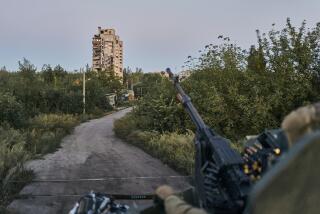Moscow Officials to Head Probe of Tbilisi Clash
- Share via
MOSCOW — Prosecutors from Moscow will head a criminal investigation of a clash between nationalist demonstrators and troops in Tbilisi, capital of the Soviet republic of Georgia, on April 9 in which 20 civilians died, Tass said Friday.
The announcement, made in a report of a meeting of the Politburo, followed accusations that Soviet authorities attempted a cover-up of the incident, particularly over the alleged use by troops of poison gas.
“Bodies of the Prosecutor’s Office of the Soviet Union will be in charge of investigating the criminal case which has been instituted over the events in Tbilisi,” the official Soviet news agency said.
This was “to ensure the objectivity and thoroughness of the investigation in accordance with the law and to provide information systematically to the population,” it said.
Tass said the Politburo, at its regular meeting on Thursday, also urged the Central Committee of the Georgian Communist Party to investigate the causes of the events the clash.
U.N. Investigation Sought
Meanwhile, in Washington, Soviet dissident Eduard Gudava asked President Bush to request a U.N. investigation of the incident.
Gudava, founder of the Helsinki Watch group in Georgia, said that far more were killed and wounded by Soviet troops during the demonstration than the 20 dead and more than 200 injured reported by the Soviet government.
The State Department has not commented on the incident.
Official accounts have maintained that troops sent in to break up an all-night vigil by thousands of people in front of the government building in Tbilisi used maximum restraint and only responded when under attack.
However, Soviet newspapers have charged that troops used poison gas against the demonstrators, and a clandestine video film of the events, shown to journalists in Moscow on Friday, appeared to show troops attacking without provocation.
Sixteen people were killed when the troops, supported by tanks, moved in and another four people subsequently died of their injuries.
Soviet television said 92 patients are still hospitalized.
Georgian film maker Eldar Shengelaya told journalists at the showing of the video that he believed Moscow must have given the go-ahead to send in the troops.
“The decision must have come from higher up, although it’s not clear where it came from,” he said. “Members of the (national party’s) Central Committee cannot but have known about it.”
Shengelaya and other speakers at the meeting accused the authorities of attempting a massive cover-up of the Tbilisi incident.
More to Read
Sign up for Essential California
The most important California stories and recommendations in your inbox every morning.
You may occasionally receive promotional content from the Los Angeles Times.













